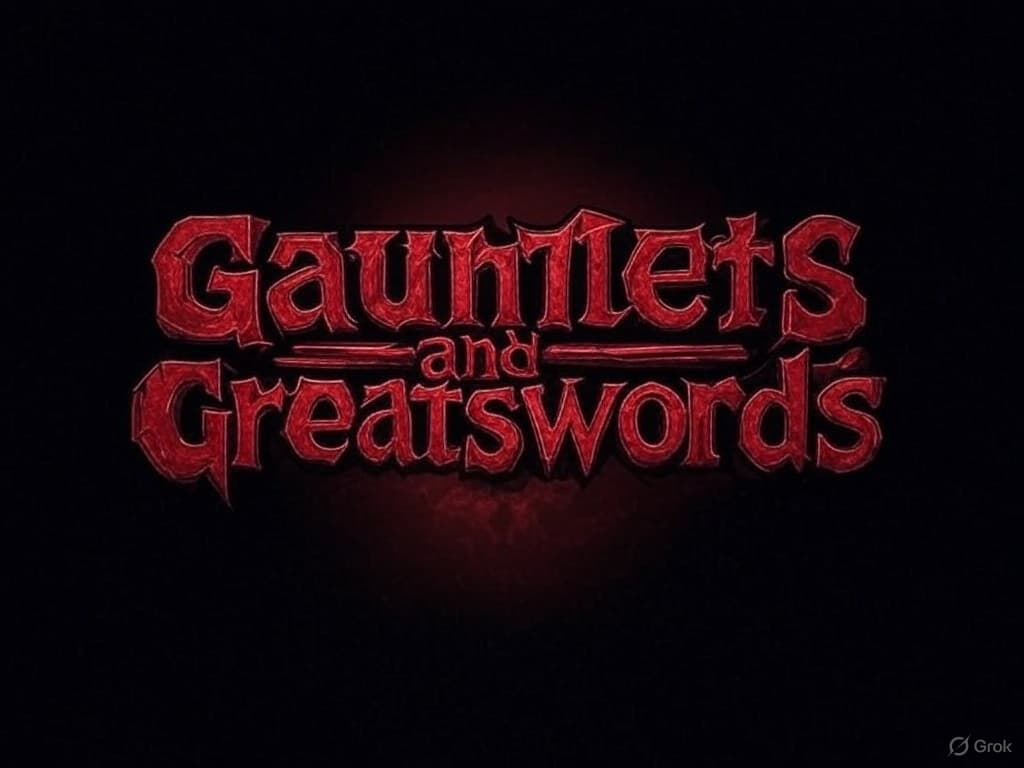Artwork & Style Guide
Artwork & Style Guide for Gauntlets and Greatswords
Game Logo Design

Logo Guidelines
The Gauntlets and Greatswords logo embodies our game's core identity: a medieval fantasy battle game with pixel art aesthetics. The bold, rugged typography evokes the brutal warrior atmosphere while maintaining readability.
The logo features a rich, blood-red gradient that suggests combat and competition, with subtle texturing that gives it a battle-worn appearance.
Key Design Elements:
- Strong, readable typography for easy recognition
- Medieval fantasy styling with rugged edges
- Blood-red color palette signifying combat and competition
- Subtle texture adding depth and weathered appearance
- Balanced proportions for flexible use across platforms
Character Sprites
Client Reference Examples
Full Character Sprite Sheet Example
Detailed Character Class Variations
Artist Implementation Examples
Artist Sprite Implementation 1
Artist Sprite Implementation 2
Sprite Technical Requirements
Character Specifications:
- 512x512 pixel character size for high resolution detail
- Single static pose per character
- Transparent background for smooth integration
- 16-bit style pixel art with enhanced detail
- Clean, readable silhouettes for gameplay clarity
Design Focus:
- Static character representations
- No animations required for Season 1
- Emphasis on distinctive character classes
- Clear visual hierarchy between trait rarities
- Optimized for both NFT display and gameplay
For Season 1, all character sprites will be static images with no animations. Each character will be represented by a single image in a neutral pose that best captures their class identity and equipped items. This streamlined approach allows us to focus on character diversity and trait quality while maintaining our accelerated development timeline.
NFT Design Approach
The NFT design strategy implements a dual-view approach: the NFT icon is a zoomed-in, cropped portrait version of the character for collection display, while the full character model is used during gameplay. This creates a cohesive visual identity between the collectible aspect and the battle gameplay.

NFT Portrait View (Collection Display)

Full Character Model (Battle View)
Artist Implementation Examples

Artist NFT Implementation 1

Artist NFT Implementation 2
NFT Collection Architecture
Collection Details:
- Total Collection Size: 8,192 unique warriors
- 8 warrior classes with equal distribution
- 4-tier rarity system (Common to Legendary)
- Magic Eden marketplace integration
- Game utility tied to NFT attributes
Trait Variations:
- 3-4 weapon types per class
- 4 armor styles per class
- 5 helmet/headgear variations per class
- 8 color schemes per class
- 3 special effects per class
- 5 background variations
Game UI Design
Battle UI Concept

Battle Screen, Combo Select, and Character Sheet UI Concepts
The UI design incorporates nostalgic pixel art aesthetics with modern usability. Battle screens feature health and status indicators, with character models displayed in static poses that represent their class and equipped items. Background elements will be kept minimal to maintain focus on the gameplay.
For Season 1, the focus is on core functionality with static character representation. No character animations will be included in the initial release, allowing for a streamlined development process while maintaining high-quality visual assets. Any animation features may be considered for future seasons based on player feedback and game performance.
Combo Selection Grid

Inventory UI Inspiration from Baldur's Gate
Combo Grid Design:
The combo selection grid draws inspiration from classic RPG inventory systems like Baldur's Gate. This nostalgic design approach uses clearly defined slots with pixel art icons representing different move options.
- 3x3 grid layout mirroring the battlefield positions
- Clear visual distinction between move types
- Minimalist slot design for easy recognition
- Highlight effects for selected moves
- Tooltip system for move details on hover
Background Art
The background art maintains our pixel art aesthetic while creating atmospheric battle environments. Inspiration comes from games like Darkest Dungeon, with moody, atmospheric scenes that establish the medieval fantasy setting without distracting from gameplay.

Sunken Ruins Environment

Candlelit Crypt Environment

Haunted Forest Environment

Ruined Cathedral Environment
Environment Themes
Battle Arena Themes:
- Castle Courtyard
- Forest Clearing
- Mountain Pass
- Desert Ruins
- Volcanic Cavern
Design Elements:
- Atmospheric lighting effects
- Environmental storytelling through details
- Medieval fantasy with dark undertones
- Clear visual distinction between arenas
- Minimal but effective animation (torches, water, etc.)